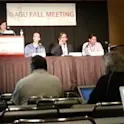
Life sciences
02 Sep 2016
One vent just isn’t enough for some volcanoes
by Simon Watt, Frontiers Science Writer One vent just isn’t enough for some volcanoes: the curious case of Mount Etna’s wandering craters. Volcanoes are geology at its most exciting. They seem so fiery, dangerous and thrillingly explosive. That may be true, but most old and mature volcanoes are surprisingly stuck in their ways and even if when they will blow is difficult to forecast, where they will blow from is often more predictable. The majority of volcanoes look as they do in a child’s drawing; like a steep mountain with its head cut off. They have a summit crater and, if they erupt, it is from this rocky orifice that lava and ash spews. But this is not the case with Mount Etna on the Island of Sicily, Italy, a study published in the open-access journal Frontiers in Earth Science found. Etna has been collecting new summits as though they are Pokémon. It is as if the mountain has had an outbreak of acne, with multiple cones forming in a geologically short space of time. According to Professor Valerio Acocella, of Roma Tre University and his colleagues from Ingv Catania, this makes Etna “perfect for study”. Valerio and […]

